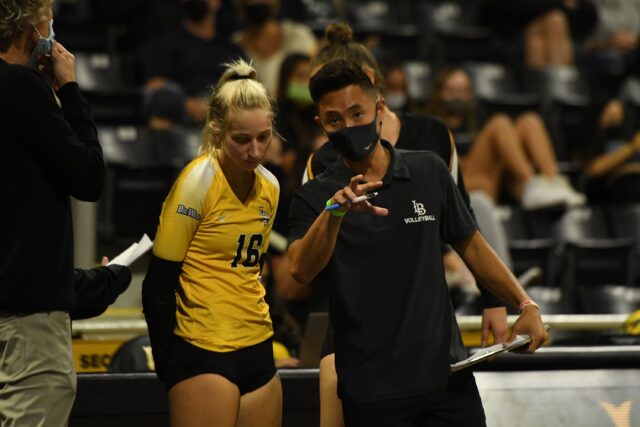Andrew Pham’s journey from a professional volleyball player to the founder of Loli Volleyball is a testament to the transformative power of mindset training in sports. With a career that spans collegiate volleyball, professional play and coaching, Pham has amassed a wealth of experience that now fuels his passion for helping athletes develop not just physically, but mentally.
From the Court to Coaching
As a Kansas City native, Andrew Pham played collegiate volleyball at Park University before being drafted to play professionally in Puerto Rico. His professional journey took him across the globe, from AVP’s pro beach volleyball in the U.S. to Germany. During the off-seasons of his professional career, Pham began coaching: first through club volleyball in North Texas, and later at Long Beach State.
Despite his success, Pham’s career was not without its challenges. “Puerto Rico really destroyed me,” Pham recalls. “I thought I was getting a contract back, but I ended up getting cut, and I didn’t have anyone to talk to.” It was through his struggles, however, that Pham discovered the importance of support and mindset in an athlete’s career. The lack of support and guidance he experienced during his time playing professionally inspired him to create Loli Volleyball, an organization dedicated to providing not only coaching and performance training but also mindset work and the emotional support he wished he had during his playing days.
The Birth of Loli Volleyball
Loli Volleyball was born out of the desire to give athletes the tools they need to excel not just on the court, but in life. “Everything that I do now, I didn’t really have,” Pham explains. It was not until he started coaching college that he realized how universal the need for support is among athletes: “The college kids… they just needed someone to talk to, and they didn’t have that. And like I said, when I got cut from Puerto Rico, I needed someone to talk to and I didn’t have that.”
Pham saw firsthand how athletes struggled with self-talk and confidence, often without anyone to help guide them. This gap in support led him to focus on helping athletes build a stronger mental foundation.
The Main Mindset Challenges
According to Pham, one of the biggest challenges athletes face is a lack of validation from their coaches. This lack of positive reinforcement can lead to a downward spiral in an athlete’s confidence and performance. The pressure to be perfect also has a huge effect on an athlete’s mindset. “If it’s only 0-1 and a coach is already criticizing an athlete,” Pham points out, “the athlete’s confidence can be deeply affected.”
Self-Talk: A Core Principle
The concept of self-talk is at the heart of Pham’s mindset coaching technique. Whether an athlete struggles with the pressure of perfection, lack of validation or a lack of confidence, their mindset is most deeply influenced by the way they speak to themselves. “The main thing is self-talk,” Pham believes, “Mentality depends on self-talk.” This principle guides Pham’s coaching, where he works to help athletes reshape their inner dialogue to be more positive and empowering.
Incorporating Mindset Work
Pham’s approach to mindset training is tailored to each athlete’s needs. Some players only need encouragement, while others may need to work on how they perceive errors — the conversations and advice he gives to one athlete may be completely different from his approach to another athlete, but through it all, he emphasizes the importance of goal setting. “We’ll meet up and just conversate about their day, their season, their life,” he shares, “and we’ll go over goals for each day, each month.” The key, according to Pham, is the difference between how we say our goals, and how we set them:
“If a freshman player sets a goal saying, ‘I want to make the varsity volleyball team,’ – you can make varsity volleyball, but what’s after that? Do you want to make a difference in varsity volleyball? Do you want to be the top freshman on the varsity volleyball team? Do you want to help make the state championships? So, it’s how we say it and how we word it that will help an athlete. Because, you can make varsity volleyball, but what’s after that? You have to have those goals and those mindsets.”
Mindset training is not limited to private conversations; Pham also integrates these principles into physical training. Whether he is coaching on-the-court techniques like passing or helping athletes understand their roles within a team, mindset is always part of the conversation. One thing Pham recommends to coaches and sports professionals is to emphasize the whys. “We need more whys in there,” he says. “Why do I pass the ball this way? Why do I need to drop my shoulder? It should be explained to them why we do things a certain way.”
Advice for Athletic Directors: Mindset and Connections
When asked what advice he would give to athletic directors, Pham had a two-pronged approach:
On one hand, he acknowledges the growing need for mindset and mentality training in today’s sports environment, where athletes face increasing stress and mental health challenges. He recommends athletic directors consider hiring a mindset coach or a sports psychologist, or even implementing a mindset training program among the coaches and staff to provide athletes with the training they need.
On the other hand, however, Pham emphasizes the importance of building strong relationships with athletes. “The main thing I would say is just to show love, show passion and show enthusiasm.” He reminisces on his own athletic director during his college career, who would always talk to him and his team, check up on them and come across them as a friend. According to Pham, this friendship motivated the team and made them play even harder.
“If you build that relationship – from the star player to the player who never leaves the bench – if you make these kids believe that you have their back, that you believe in them, then you’ve won already. Because that is a unit, that is a group that works together, and they would go to war for you.”
Building the Complete Athlete
Through Loli Volleyball, Andrew Pham is not just coaching athletes; he is building complete athletes—those who are not only physically strong but mentally resilient. His journey from professional volleyball player to mindset coach has equipped him with the insights and experience needed to make a lasting impact on the lives of young athletes. By focusing on mindset, self-talk, and personal growth, Pham is helping athletes unlock their full potential, both on and off the court.




